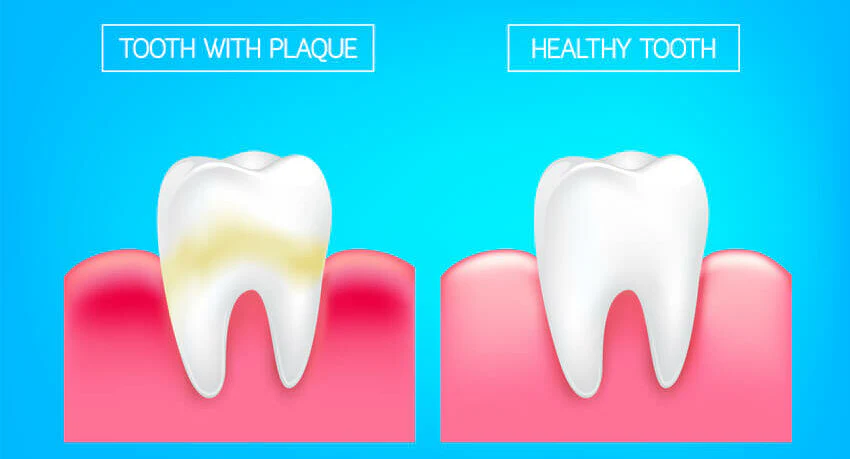Many of us hear about dental plaque when we go to the dentist, but do we truly know what it is and how it affects our oral health? Plaque is not just a small problem—it plays a big role in causing many dental issues like cavities and gum disease. In this detailed guide, we will cover all the important information about dental plaque and how to manage it effectively.
What is Dental Plaque?
Dental plaque is a sticky, clear layer that builds up on your teeth when salivary food bits and bacteria mix together. Plaque is a normal thing that forms in your mouth, but if you don’t take care of your teeth, it can turn into tartar and cause serious dental issues.
How Plaque Develops
Plaque starts to build up when bacteria in your mouth eat sugars and starches from the food you eat. When bacteria eat carbohydrates, they make acids that can damage teeth and make gums sore.
Where Plaque Accumulates
- Along the gumline, plaque tends to build up where your teeth and gums meet, which increases the risk of gum disease in this area.
- Between Teeth: Plaque likes to hide in places that are difficult to reach.
- On the Tooth Surface: Cleaning molars can be difficult because they have grooves and crevices.
Why is dental plaque harmful?
Leading to Cavities: Acids in plaque can damage the outer layer of your teeth, causing tiny holes known as cavities. If cavities are not treated, they can get worse and cause pain or infections.
Contributing to gum disease: Plaque that builds up near your gums can make them swollen and red, which is called gingivitis. If not treated, this can lead to periodontitis, a more serious type of gum disease that can cause you to lose your teeth.
Causing Bad Breath: Plaque contains bacteria that can create bad smells, causing ongoing bad breath (halitosis).

How to Effectively Remove Dental Plaque?
Getting rid of plaque is important for keeping your smile healthy.
1. Daily Brushing: Make sure to use toothpaste with fluoride and brush your teeth two times every day for at least two minutes. Pay attention to every part of your teeth, especially the area close to the gums.
2. Regular Flossing: Flossing helps get rid of plaque and bits of food stuck between your teeth that a toothbrush can’t reach.
3. Using Mouthwash: Mouthwash with antibacterial or fluoride can kill germs and prevent plaque from accumulating in your mouth.
4. Professional Dental Cleanings: Going to the dentist every six months for a cleaning helps to make sure that plaque and tartar are taken off your teeth by a professional.
Preventing Plaque Formation
Stopping plaque from forming on your teeth is the most effective way to avoid dental problems.
Healthy diet choices: Reduce the amount of sugary and starchy foods you eat, as they can help bacteria that cause plaque to grow. Make sure to eat foods that have a lot of calcium, such as dairy products, to make your enamel stronger.
Stay Hydrated: Make sure to drink water all day to wash away food bits and germs. Chewing gum without sugar can help make more saliva in your mouth, which can clean it naturally.
Quit Smoking: Tobacco products can cause plaque to build up on your teeth and make you more likely to get gum disease.
Advanced Treatments for Plaque Management
When plaque becomes tartar, it is important to seek help from a dental professional. Below are the possible treatments you may come across
Scaling and Root Planing: This thorough cleaning process gets rid of tartar from both above and below the gumline.
Laser Therapy: Sometimes dentists use lasers to get rid of plaque and tartar without using sharp tools.
Regular Dental Exams: Regular dental checkups help your dentist keep an eye on how much plaque is on your teeth and give you tips on how to better take care of your mouth.
FAQ’S
1. Does everyone have dental plaque?
Yes, most people get dental plaque because it happens naturally in our mouths.
2. Why are my teeth prone to plaque?
If your teeth are getting more plaque than usual, there could be a few reasons why this is happening.
3. How Quickly Does Plaque Form?
Plaque can begin to develop on your teeth just 4–12 hours after you brush them. Brushing your teeth two times a day is very important.
4. Can Plaque Be Removed Naturally?
Getting your teeth cleaned by a dentist is important because it helps remove tartar that brushing and flossing alone can’t get rid of.
5. What Happens if Plaque Isn’t Removed?
If you don’t take care of plaque on your teeth, it can cause cavities and gum disease, and you may end up losing your teeth.
6. Does diet affect plaque buildup?
Eating too many sugary and starchy foods can cause plaque to build up on your teeth. But if you eat a balanced diet, it can help stop plaque from forming.
7. Is Tartar the Same as Plaque?
No tartar is hardened plaque that needs to be removed by a dentist or dental hygienist.
Dental plaque is something that many people deal with, but it can be controlled. By brushing your teeth regularly, eating healthy foods, and seeing your dentist often, you can prevent plaque buildup and keep your smile looking great. Improve your oral health now because having a clean, plaque-free mouth is not only about appearance but also about your overall health.

